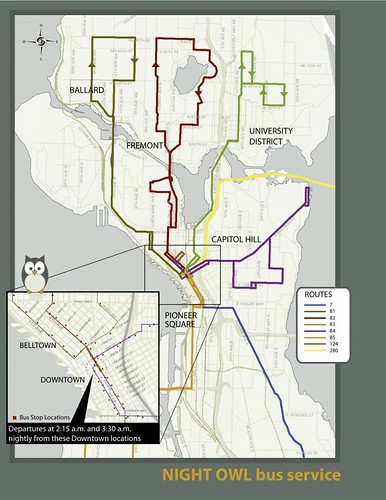
What was Seattle’s mayor doing at Washington Hall Tuesday night? Mike McGinn rolled out his office’s newly released Seattle Nightlife Initiative Community Report including strong support for later bar closing times and better late night transportation. We’ve pulled out some highlights and our takeaways from the report. Full report including survey results and feedback collected from various community meetings is embedded below.
- Interesting to note that the “Central Area/Squire Park” didn’t crack the top nightlife destinations for survey respondents even with the options in the area of 12th Ave and the in the Cap Hill convergence zone along Madison. When people think about nightclubs, they think “Capitol Hill.”
- “…more than 80 percent of online respondents agreed or strongly agreed that, ‘Extending service hours will make our streets safer.'”
- “Support for late-night transportation options other than driving was widespread. Nearly 90 percent of respondents agreed or strongly agreed with the statement, ‘People would be less likely to drive under the influence if there were late-night forms of transportation like taxi stands and public transit available after bars close.'”
- One option visualized for the report is the friendly Night Owl Bus Service that would pick up drunk people up and down Pioneer Square, Belltown, Downtown and Pike/Pine and deposit them to far lung points like Ballard and West Seattle.
- Maybe the most straightforward, practical transportation solution in the report: Starting in April, pay parking stations will begin operating at 10 PM to allow drivers to pre-pay for up to two hours of morning parking time. The current meters don’t turn on until 4 AM to accept pre-pay.
- This 2,200+ pool of Seattleites is a confident bunch. Less than 15% said theyfelt unsafe on the streets at night.
- The survey respondents were also not highly concerned about noise as “only 6 percent of respondents reported having a significant problem with nightlife-related noise at least once per month. And 65.8 percent reported that they had never experienced this problem.” The report notes more concern about noise was voiced by attendees at the community meetings.
- Concerns about unfair enforcement at venues featuring live hip-hop acts and at gay and lesbian establishments were also documented in the report:
Online, many were concerned about the relationships the Seattle Police Department and Washington State Liquor Control Board have with gay and lesbian nightlife venues. Respondents asked that officers with pro-gay values be assigned to enforcement at gay clubs and bars, and that more effort be made to crack down on anti-gay harassment and street violence, particularly in Capitol Hill. In response to these concerns, the Mayor requested an audit of the Code Compliance team’s enforcements to be completed by the city’s nightlife coordinator.
- Finally, the report reminds that the city’s douchebag laws go into effect starting this weekend:
The Nighttime Disturbance Ordinance was passed by the City Council on August 2, 2010. It creates a new civil infraction for loud noise, threats or fighting that occur in a public place in a commercial or industrial zone between the hours of midnight and 5 a.m. The noise provisions of the ordinance were approved by the Department of Ecology in November and SPD is currently conducting officer training on the ordinance. Enforcement will begin in January 2011.
Here’s the Seattle Times take on the update. Full report from the mayor’s office is below. You can view the complete survey results here.





So how do these results accurately reflect the opinions of Seattle citizens?
When the Mayor’s staff attended our August EPCPC meeting, my recollection was that not one person was in favor of extended liquor sales, several were concerned about the effectiveness of the noise enforcement procedure, and no one understood how this initiative will make streets safer. I heard the same concerns, although more vehemently voiced, at the heavily attended Belltown Community Council meeting a week or so before EPCPC’s meeting. Also- our newly formed Community Leaders for Public Safety group, which includes representatives from the entire city, everyone feels that this is not an effective solution to increase public safety. One continuous concern that keeps arising is that many “partiers”, once the 2 AM closing time approaches, will head to those select bars identified for later closing times; (most likely in Belltown, Pike/Pine and Pioneer Square) line up on the street, waiting to get in and ….? Others commented that bars could stay open later, but why do they need to keep selling liquor past 2 am? In the report, it was quoted, “Less than 15% said theyfelt unsafe on the streets at night”. Belltown and downtown residents have told me that you are okay if you are home by 8 PM…
And, how can we afford late night public transportation when we are struggling with a budget crisis?
At the sparsely attended press conference Tuesday evening, 12/28, the event began with two young poets. I thought, how can extended liquor sales benefit these talented performers??? Why not put the money it is…
read more
costing the city (Staff time, presentations, etc) into supporting artists directly?
Who exactly would profit from this, if it goes into effect?
-Stephanie Tschida